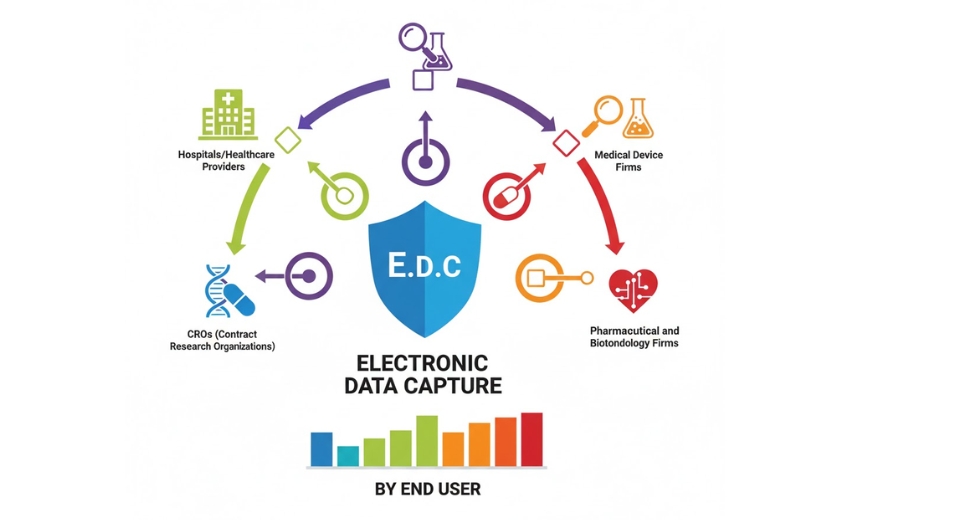
Nov 18, 2025

In an age of research where data determines the speed and success, the electronic data capture market as shown by the research group from Metastat Insight, is increasingly gaining importance as the main point of interest for the various participants such as healthcare, clinical research and the regulatory sector. With the growing number of both clinical and real-world evidence to handle, the market is going to be the main facilitator for the smooth running of the process, high quality of data and very fast development cycles.
Market Context
Clinical trials and research programmes are under pressure from multiple fronts: increasing amounts of patient data, more complicated protocols, dispersal of trial sites and more demanding regulations regarding data accuracy and auditability. The traditional paper-based or manual entry methods are becoming extinct not only due to the increased pace of studies but also the globalisation of research efforts.
The electronic data capture market, with its platforms and systems, is entering this scenario, which is creating specific solutions to address the mentioned pain-points. Through the provision of structured, digital collection and management of study data, the market backs the sponsors, contract research organizations (CROs), and university institutions to comply with the stringent timelines, stricter regulations, and requirements for data input from several sites, even remote.
How It Works / Why It’s Valuable
The market for electronic data capture fundamentally consists of software and service solutions that digitalize case report forms and replace paper ones, allow for centralized data review, connect with other systems (like electronic health records or lab information systems), and provide audit trails, validation, and reporting tools. The mentioned functions make it possible to gather data in the medical facility or at home, pointing out mistakes early, and starting the analysis sooner.
The electronic data capture market has among its unique advantages the data quality improvement (due to structured formats), quicker turnaround between data capture and insight, better support for remote or decentralised trial models, and scalability (especially when cloud-based delivery modes are used). The typical applications are covering phase I-IV clinical trials, post-market surveillance, patient-reported outcomes, and real-world evidence generation.
Growth Story / Technological Evolution
The electronic data capture systems were first adopted in the life sciences and became a niche product in big pharmaceutical firms. Today the market is widely turned to CROs, hospitals, and smaller biotech players. The on-premise software is now replaced by web-hosted and cloud solutions that come faster roll-out and global access).
The developments of analytics integration, artificial intelligence, tokenisation of real-world datasets, and mobile front-ends for patient input are the latest enhancements. These innovations have not just increased the value of the electronic data capture market but have also provided richer data collection, better cross-system interoperability, and more flexible study designs suitable for decentralised and hybrid trials.
Regional or Global Trends
Currently, the North American region leads the electronic data capture market in terms of adoption, this trend being largely due to a strong clinical research infrastructure, high R&D investment and regulatory none the less strict, but qualitatively rewarding data integrity. Asia-Pacific is the most rapidly growing region thanks to the factors mentioned above, along with an increase in the outsourcing of clinical trials, digitisation of healthcare and progressive government policies in regard to digital healthcare infrastructure. The markets of Latin America, the Middle East and Africa offer the possibility of expansion taking into account the aforementioned factors of change and investment made in these regions in eHealth platforms and regulatory modernization.
Challenges and Opportunity
Concerns and problems are raised by the adoption of electronic data capture solutions, such as high costs for the implementation, specialist staff and training, complexity with the existing systems and concerns about security, privacy and interoperability of data. However, if a downside is to be mentioned, then it should be the strong potential in connecting EDC platforms with other digital-health technologies (e.g. electronic health records, mobile apps, remote monitoring devices), the use of real-world data sources for post-market studies, supporting decentralized clinical trial models, and so on. Those providers who will be able to offer flexible, user-friendly and secure platforms will attract more customers.
Why It Matters Now
The electronic data capture market presented by Metastat Insight aligns with broader trends in digital transformation, healthcare modernisation and global research acceleration. With pressures to reduce trial durations, expand geographically, engage patients remotely and generate real-world evidence, efficient data capture has become essential rather than optional.
For sponsors and investigators seeking to maintain competitiveness and regulatory compliance, this market offers critical tools. As the research ecosystem evolves toward cloud-native, integrated and patient-centric models, the electronic data capture market stands in a strategic position to shape how future studies are designed, conducted and analysed reinforcing its role as a catalyst for advancement across the clinical research landscape.
Drop us an email at:
Call us on:
+1 214 613 5758
+91 73850 57479